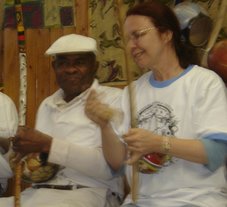The good thing about a blog is that, being a bit like a journal, it can include past and present events. I'm attending the Caribbean Studies Association conference in Salvador this week and have had at least two opportunities to discuss and learn about different aspects of Capoeira. The resulting musings promise (or threaten) to be longer than I'd originally planned, so I'll divide them into parts - the first on "race" and the second on "gender".
On Tuesday morning, I had a very interesting discussion with La Vinia Delois Jennings that covered, among other things, the political aspects of associating or divorcing Capoeira with/from its African roots.
In the US, Capoeira is often used by African-Americans and appropriated by a group that a friend calls "Africans with a k" as an affirmation of African culture and identity. This is all well and good, except that many of them buy into the Regional spiel that Capoeira was developed in Brazil by Africans whose hands were always shackled, so they fought with their feet instead.
In Brazil, the same government that legalised Capoeira in the 30s also made a strenuous effort to "regionalise" and "Brasilianise" it. My theory is that, since Capoeira was being co-opted and "decriminalised" so it could packaged as a commodity to be sold to the middle classes, it would be more palatable to non-blacks if it were presented as Brazilian and not Afro-Brazilian. The title of Capoeira: A Brazilian Art Form by Bira Almeida (aka Mestre Acordeão) evokes howls of outrage outside Brazil but clearly expresses the Regional viewpoint.
I've heard more than one Regional mestre (both in person and in televised documentaries) claim that the Africans who supposedly invented Capoeira in Brazil were imitating monkeys, stingrays, goats, etc. In other words, the presupposition is that they lacked such moves in their cultural repertoire, so they had to learn them from the beasts of the earth and the fish of the sea! One (white) Regional mestre, who shall remain nameless, had the gall to say that the masters should be thanked for whipping their slaves and forcing them to develop a martial art.
Here, in a nutshell, is the response I've come up with over the years - not being one for quick, off-the-cuff retorts: After visiting Nigeria about 17 years ago and hearing that people in rural areas engage in a similar form of martial art, and also learning of the existence of N'golo in what is now Angola, I am convinced that Africans from several parts of the continent pooled and fused their knowledge to develop what we now know as Capoeira. Not only did they bring the knowledge with them, but enslaved Africans and their descendants rarely went about with their hands in shackles. For one thing, it would make it awfully hard to swing a machete in the cane fields, or stuff sugarcane stalks into a mill, etc. etc.
Also, many were sent out into the streets as slaves-for-hire and led relatively independent lives, bound only to deliver a specific sum of money to their "owners" on a weekly or monthly basis. Slavery was not a monolith in Brazil. By the time it was abolished in 1888, thousands of Africans and their descendants had been freed by a) purchasing or being granted manumission or b) qualifying for freedom under the "free womb" and "sexagenarian" laws, etc. etc. In fact, some slave traders and slaveowners were black.
Therefore, there is no question in my mind about the "Africanness" of Capoeira - despite its indigenous name - but its history is still shackled (pardon the pun) by serious misconceptions about the realities of slavery in Brazil.
*I put "race" in quotes because I believe the human race should not be subdivided.
Thursday, 31 May 2007
Subscribe to:
Post Comments (Atom)


No comments:
Post a Comment